Ecuador, situated between Colombia and Peru and long considered to be a peaceful nation, is facing perhaps its biggest security crisis. On Tuesday, heavily armed gangsters stormed the studio of a major television station during a live broadcast. The incident comes amid a series of seemingly coordinated attacks across the South American country, prompting President Daniel Noboa to declare a state of “internal armed conflict”. The United States has also reacted to the situation, condemning the “brazen attacks” in Ecuador and said it is “co-ordinating closely” with President Noboa and his Ecuadorean government and stands “ready to provide assistance”. Let’s take a closer look at what’s happening in the Andean nation. Storming a TV station On Tuesday, armed men wearing balaclavas burst into the studio of a public television station, TC Televisión network, in Ecuador’s largest city, Guayaquil, at about 2pm local time. The men could be seen on camera carrying pistols, shotguns, machine guns, grenades and sticks of dynamite, and someone was heard yelling “Don’t shoot!” before the signal was eventually cut.
A New York Times report said that one of the gunmen, who had stormed the TV station could be heard on air saying he intended to send a message about the consequences of “messing with the mafias.” [caption id=“attachment_13595552” align=“alignnone” width=“640”]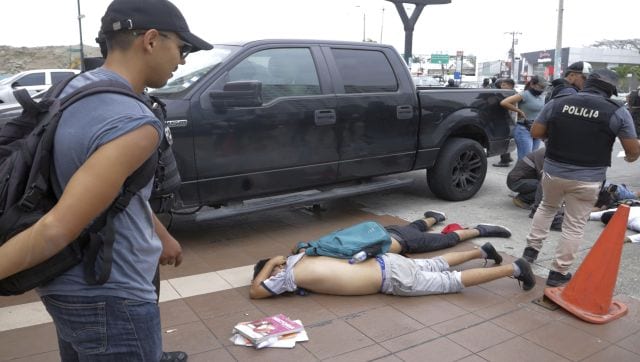 Men lie face down on the ground, detained by police outside TC Television, after a producer told police that they were part of a group who broke onto their set during a live broadcast in Guayaquil, Ecuador. AP[/caption] Thirty minutes into the gunmen storming the studio and taking the journalists and staff hostage, the police stormed the premises and arrested the men – 13 in all. The authorities added that no one had been killed in the attack and that the intruders would be charged with terrorism.
Men lie face down on the ground, detained by police outside TC Television, after a producer told police that they were part of a group who broke onto their set during a live broadcast in Guayaquil, Ecuador. AP[/caption] Thirty minutes into the gunmen storming the studio and taking the journalists and staff hostage, the police stormed the premises and arrested the men – 13 in all. The authorities added that no one had been killed in the attack and that the intruders would be charged with terrorism.
Alina Manrique, the head of news for TC Television, told the Associated Press that she was in the control room at TC Television, across from the studio, when the masked men burst into the building. One of them pointed a gun at her head and told her to get on the floor, Manrique said. “I am still in shock” Manrique told The Associated Press in a phone interview. “Everything has collapsed… All I know is that it’s time to leave this country and go very far away.” Later, police chief César Zapata said that his officers had seized gun and explosives from the 13 arrested, saying, “This is an act that should be considered as a terrorist act.” Violence in Ecuador The shocking incident of the men storming the television studio, which was beamed into houses across Ecuador, comes at a time when large-scale violence has broken out, with criminal groups launching a wave of terror. The latest flare-ups can be traced back to Sunday when Adolfo Macías , leader of the feared Los Choneros gang who is better known by his alias Fito, was first reported missing from his cell in the Regional prison complex in the violent port city of Guayaquil. He had been scheduled to be transferred to a maximum security facility that day. The government had ordered the transfer of high-profile convicts such as Macías from their prison cells to maximum-security facilities, and many experts opine that it is this decision that led to the escape of Macías.
Macías is possibly one of the biggest gang leaders in Ecuador, and was serving a 34-year jail sentence on charges, including drug trafficking. In fact, according to officials, the Los Choneros gang is the first in Ecuador to build ties with the powerful Mexican cartels. Macias’ escape from prison led to chaos inside and outside of the jails, with some speculating that it’s an attempt by the gangs to show their strength. Within hours of his escape, a string of attacks took place across Ecuador. The Financial Times has reported that at least seven Ecuadorean police officers have been kidnapped by criminals. Moreover, in Quito, the capital, a vehicle carrying liquefied petroleum gas was set ablaze at a petrol station. [caption id=“attachment_13595572” align=“alignnone” width=“640”]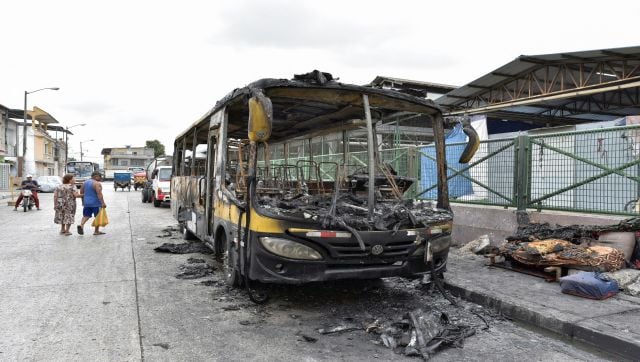 People walk past the remains of a burned bus after Ecuador’s president Daniel Noboa declared a 60-day state of emergency following the disappearance of Adolfo Macias, leader of the Los Choneros criminal gang, from the prison where he was serving a 34-year sentence, in Guayaquil, Ecuador. Reuters[/caption] Additionally, in Cuenca, a popular hilltop city, assailants lobbed an explosive at a military truck. And in Esmeraldas, the police reported three explosions. On Tuesday (9 January), 32 inmates also escaped prison in Riobamba, in the central Andes. , Fabricio Colón, one of the leaders of the Los Lobos gang, was among the 32 who escaped. Twenty escapees were recaptured, though Colón is among those still at large. An AFP report said that a total of 10 people, including two law enforcement officers, have been killed in the violence. Eight people were dead and three injured in a series of attacks in the port city of Guayaquil, a local police chief said at a press conference. In a separate statement posted on X, police also said that two officers were “viciously murdered by armed criminals” in the nearby town of Nobol. [caption id=“attachment_13595582” align=“alignnone” width=“640”]
People walk past the remains of a burned bus after Ecuador’s president Daniel Noboa declared a 60-day state of emergency following the disappearance of Adolfo Macias, leader of the Los Choneros criminal gang, from the prison where he was serving a 34-year sentence, in Guayaquil, Ecuador. Reuters[/caption] Additionally, in Cuenca, a popular hilltop city, assailants lobbed an explosive at a military truck. And in Esmeraldas, the police reported three explosions. On Tuesday (9 January), 32 inmates also escaped prison in Riobamba, in the central Andes. , Fabricio Colón, one of the leaders of the Los Lobos gang, was among the 32 who escaped. Twenty escapees were recaptured, though Colón is among those still at large. An AFP report said that a total of 10 people, including two law enforcement officers, have been killed in the violence. Eight people were dead and three injured in a series of attacks in the port city of Guayaquil, a local police chief said at a press conference. In a separate statement posted on X, police also said that two officers were “viciously murdered by armed criminals” in the nearby town of Nobol. [caption id=“attachment_13595582” align=“alignnone” width=“640”]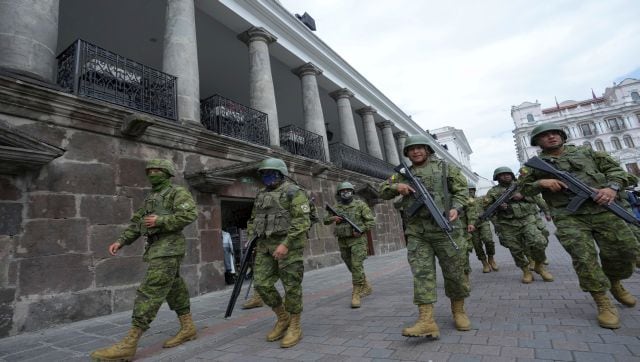 Soldiers patrol outside the government palace during a state of emergency in Quito, Ecuador. AP[/caption] Government Speaks Responding to the wave of attacks, Ecuador’s president
Noboa
declared that an “internal armed conflict” now existed in the country and he was mobilising the armed forces to carry out “military operations to neutralise” what he called “transnational organised crime, terrorist organisations and belligerent non-state actors”. A state of curfew has also been declared for a period of 60 days, from 11 pm to 5 am, to restrict meetings and actions that may threaten public order. On Monday, Noboa vowed to bring the fight to the cartels and gangs, saying, “We are not going to negotiate with terrorists. “These narcoterrorist groups intend to intimidate us and believe that we will give in to their demands.” While Noboa remains firm in his fight, experts note that Tuesday’s event is significant and marks a new peak of violence in the country. “This is a turning point. “Depending on how the government responds it will set the precedent for these kinds of incidents to continue, or it will use this as a catalyst and make some very necessary structural reforms so that the state can start to win its war against crime,” Will Freeman, a political analyst at the Council on Foreign Relations was quoted as telling the Associated Press. [caption id=“attachment_13595602” align=“alignnone” width=“640”]
Soldiers patrol outside the government palace during a state of emergency in Quito, Ecuador. AP[/caption] Government Speaks Responding to the wave of attacks, Ecuador’s president
Noboa
declared that an “internal armed conflict” now existed in the country and he was mobilising the armed forces to carry out “military operations to neutralise” what he called “transnational organised crime, terrorist organisations and belligerent non-state actors”. A state of curfew has also been declared for a period of 60 days, from 11 pm to 5 am, to restrict meetings and actions that may threaten public order. On Monday, Noboa vowed to bring the fight to the cartels and gangs, saying, “We are not going to negotiate with terrorists. “These narcoterrorist groups intend to intimidate us and believe that we will give in to their demands.” While Noboa remains firm in his fight, experts note that Tuesday’s event is significant and marks a new peak of violence in the country. “This is a turning point. “Depending on how the government responds it will set the precedent for these kinds of incidents to continue, or it will use this as a catalyst and make some very necessary structural reforms so that the state can start to win its war against crime,” Will Freeman, a political analyst at the Council on Foreign Relations was quoted as telling the Associated Press. [caption id=“attachment_13595602” align=“alignnone” width=“640”]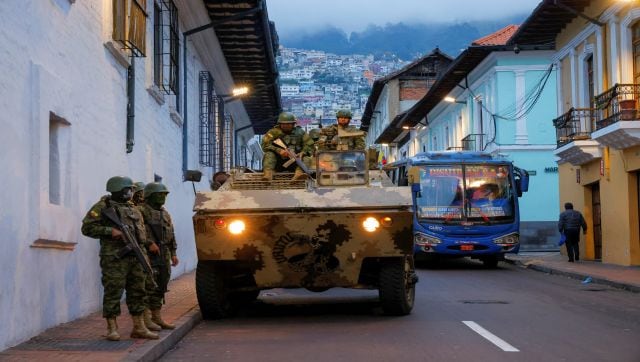 Soldiers in an armoured vehicle patrol the city’s historic centre following an outbreak of violence in Quito, Ecuador. Reuters[/caption] Ecuador’s brush with violence Ecuador has seen violence explode in recent years as rival gangs with links to Mexican and Colombian cartels vie for power. Violence has risen significantly in the country recently – with official data showing that the murder rate had quadrupled from 2018 to 2022. In fact, in 2023, the country recorded a whopping 7,800 homicides and 220 tonnes of drugs had been seized,. The murder rate quadrupled from 2018 to 2022. Last year was the most violent yet with more than 7,800 homicides in the country of about 17 million people and 220 tons of drugs seized, a new record. Moreover, since February 2021, clashes between prisoners have left more than 460 dead, many beheaded or burnt alive. Inside Ecuador’s prisons, the gangs have taken advantage of the state’s weak control to expand their power. With inputs from agencies
Soldiers in an armoured vehicle patrol the city’s historic centre following an outbreak of violence in Quito, Ecuador. Reuters[/caption] Ecuador’s brush with violence Ecuador has seen violence explode in recent years as rival gangs with links to Mexican and Colombian cartels vie for power. Violence has risen significantly in the country recently – with official data showing that the murder rate had quadrupled from 2018 to 2022. In fact, in 2023, the country recorded a whopping 7,800 homicides and 220 tonnes of drugs had been seized,. The murder rate quadrupled from 2018 to 2022. Last year was the most violent yet with more than 7,800 homicides in the country of about 17 million people and 220 tons of drugs seized, a new record. Moreover, since February 2021, clashes between prisoners have left more than 460 dead, many beheaded or burnt alive. Inside Ecuador’s prisons, the gangs have taken advantage of the state’s weak control to expand their power. With inputs from agencies
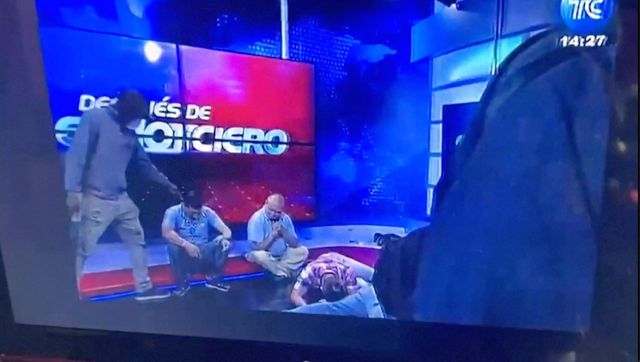)